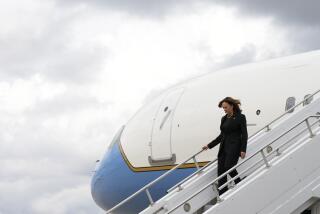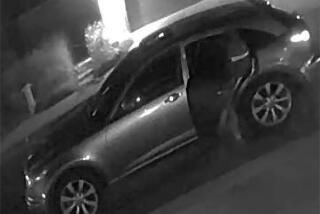Supreme Court to hear case on arrest at Cheney event
- Share via
Reporting from Washington — The Supreme Court agreed to decide whether a Secret Service agent can be held liable for arresting a Colorado man who confronted then-Vice President Dick Cheney and told him his “policies in Iraq are disgusting.”
The justices will consider an issue potentially significant to all Americans — whether they can criticize public officials without fear of arrest.
But the case before the court is complicated in two ways. First, it involves Secret Service agents who have a special duty to act quickly and decisively to protect the president and vice president from harm.
And second, the Colorado man touched or pushed Cheney as he confronted him, and a lower court said his arrest was justified for that reason.
Nonetheless, the U.S appeals court in Denver cleared the way for the Colorado man to proceed with the part of his suit arguing that his arrest was in retaliation for his critical comments, and therefore a violation of the 1st Amendment.
Obama administration lawyers joined with attorneys for Secret Service Agent Virgil “Gus” Reichle and Daniel Doyle, a second agent on the scene, in urging the high court to take up the case and dismiss the lawsuit. They argued the agents protecting Cheney had acted reasonably and deserved to be shielded from personal lawsuits for doing their jobs.
In June 2006, Steven Howards spotted Cheney emerging from a shopping mall in Beaver Creek, Colo., and chatting amiably with several people. Agents overheard Howards talking on his cellphone, saying, “I’m going to ask [Cheney] how many kids he’s killed today.”
Howards then approached the vice president, made his comment and allegedly pushed or touched him on the shoulder. Accounts differed on whether it was a soft touch or a push.
Nothing happened immediately, but Reichle, a Secret Service coordinator on the scene, heard about the incident from other agents. He then confronted Howards, accused him of an assault and ordered his arrest when he denied putting his hand on the vice president.
Howards was detained for several hours and released. A harassment charge lodged against him was dismissed.
He then sued Reichle and Doyle and accused them of violating his 4th Amendment rights protecting against an unreasonable seizure and his 1st Amendment right to freedom of speech.
In March, Howards won a split decision from the U.S. 10th Circuit Court of Appeals in Denver. Its judges said his arrest was reasonable and lawful, but they nonetheless agreed he could sue the agents under the 1st Amendment for arresting him in retaliation for his critical words.
“This rule exposes Secret Service agents to the risk of lawsuits each time they confront a potential threat to the president or vice president,” said Sean Gallagher, a Denver lawyer who represents the agents.
The justices agreed to hear the appeal in Reichle vs. Howards and to rule by late June.
Meanwhile, the court let stand school policies in New York City and elsewhere that forbid using school buildings for “worship services.”
The Bronx Household of Faith, a small Christian evangelical group, had contended the policy amounted to discrimination based on its religious messages. The high court in the past has said that public schools, libraries and other public facilities that open their doors to some community groups may not exclude others simply because their message involves religion.
But the New York City school board drew a line at worship services, arguing this would turn a school building into a church. The court said in a brief order it would not hear the Christian group’s appeal.
More to Read
Sign up for Essential California
The most important California stories and recommendations in your inbox every morning.
You may occasionally receive promotional content from the Los Angeles Times.














